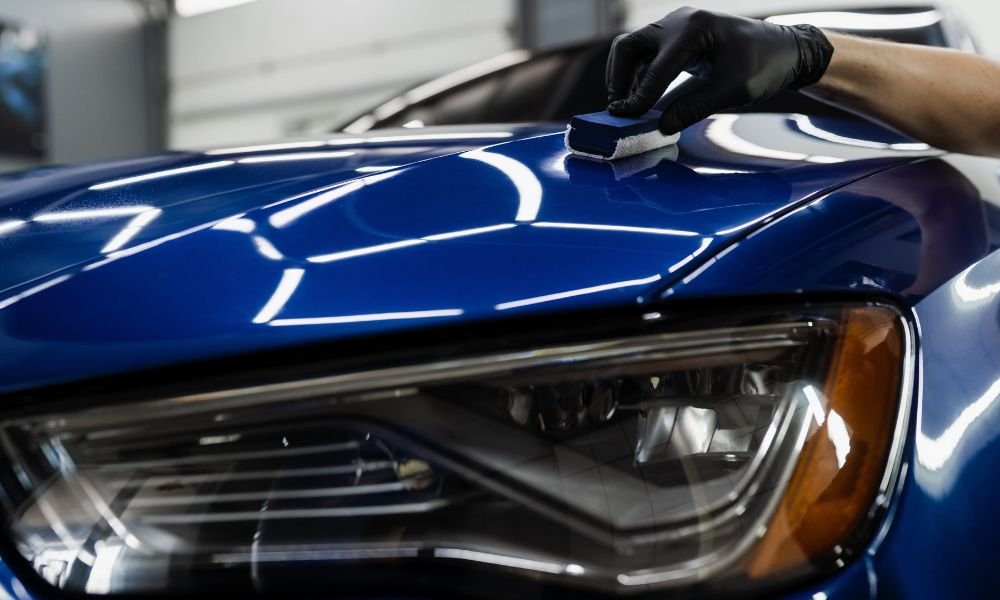Protect your car with high-quality paint protection film for maximum scratch resistance.
Protect your car with high-quality paint protection film for maximum scratch resistance.
Blog Article
A Comprehensive Guide to the Types of Ceramic Covering on the Market
Ceramic coatings have arised as a critical solution across different sectors due to their unique residential or commercial properties and applications. As we discover the distinctive characteristics and applications of these finishes, the implications for efficiency and durability become significantly apparent, raising inquiries regarding which type could finest fit your needs.
Recognizing Ceramic Coatings
Ceramic layers are innovative safety options that have actually acquired popularity in various sectors, particularly in vehicle and aerospace applications. These finishes are composed of a liquid polymer that, when cured, creates a sturdy, hydrophobic layer externally of the substrate. This layer supplies boosted resistance to ecological pollutants, UV radiation, and chemical exposure, therefore expanding the life and visual charm of the underlying material.
The fundamental part of ceramic layers is silica, which adds to their hardness and resilience. The application procedure commonly entails surface area prep work, application of the finishing, and curing, which can be achieved with warmth or UV light. As soon as cured, ceramic finishings show extraordinary bonding residential properties, allowing them to stick highly to a variety of surfaces, consisting of metals, plastics, and glass.
Along with their protective functions, ceramic coatings also provide simplicity of maintenance. Their hydrophobic nature decreases the adherence of dust and grime, making cleaning less complex and much less constant. Generally, the adoption of ceramic coatings represents a considerable innovation in surface area security modern technology, giving both practical and visual advantages throughout multiple industries.
Types of Ceramic Coatings
Various types of ceramic layers are available, each made to satisfy details performance demands and applications - ceramic coating sarasota. One of the most usual types include:
Silica-based Coatings: These finishes mainly contain silicon dioxide and are known for their resilience and chemical resistance. They are extensively made use of in auto and commercial applications.
Titanium Dioxide Coatings: Renowned for their photocatalytic residential properties, titanium dioxide coatings are frequently used in settings where self-cleaning and antifungal homes are preferable, such as in structure materials and automobile finishes.
Zirconia Coatings: Identified by their high-temperature security and thermal resistance, zirconia finishes are made use of in applications such as generator engines and high-performance automobile elements.
Alumina Coatings: Showing excellent hardness and thermal stability, alumina layers are often utilized in wear-resistant applications, consisting of cutting devices and industrial machinery. - Auto Detailing
Crossbreed Coatings: Incorporating the properties of different products, hybrid coatings offer enhanced performance characteristics, making them ideal for special and requiring applications.
Each sort of ceramic coating serves unique functions, allowing users to select one of the most appropriate service based upon certain ecological conditions and performance needs.
Benefits of Ceramic Coatings
Ceramic coatings, in particular, offer many benefits that make them progressively prominent amongst manufacturers and consumers alike. These finishings are resistant to scratches, chemicals, and UV rays, ensuring that the underlying surface continues to be protected over time.
In enhancement to durability, ceramic finishings offer exceptional hydrophobic buildings, permitting easy cleaning and maintenance. This water-repellent nature reduces the adherence of dirt, crud, and various other impurities, which can extend the aesthetic charm and performance of blog here the surface. Ceramic finishes can significantly boost thermal resistance, making them perfect for applications that endure high temperatures.

Application Process
When using ceramic coverings, a careful strategy is necessary to attain optimum outcomes. A tidy surface makes certain appropriate attachment of the coating.
When the surface is prepped, the next step is to apply the ceramic coating. The coating should be applied in slim layers, as thicker applications can lead to unequal surfaces.
After application, the finish requires a specific curing time, usually varying from a couple of hours to a complete day, relying on the product. During this moment, it is important to stay clear of exposure to wetness or impurities. Lastly, a gentle buffing might be needed after healing to improve the gloss and remove any high places. Complying with these steps faithfully will optimize the efficiency and longevity of the ceramic coating, offering a long lasting safety layer for the surface.
Upkeep and Durability
To ensure the long life and performance of a ceramic finish, normal maintenance is necessary. Ceramic finishes, understood for their toughness and safety top qualities, need specific care routines to maximize their life expectancy and performance.
Along with routine cleaning, periodic assessments are vital. Seek indications of wear or damages, such as hydrophobic properties decreasing or surface imperfections. If needed, a light gloss might be related to renew the finishing without stripping it away.
In addition, the application of a helpful site booster spray can boost the coating's hydrophobic results and recover its gloss. This is particularly advantageous for coatings that have actually remained in usage for an extensive duration. Eventually, by adhering to these upkeep techniques, one can dramatically see this site extend the life of a ceramic coating, making sure that it remains to offer optimal defense against ecological variables and keep the aesthetic charm of the automobile.
Final thought

Report this page